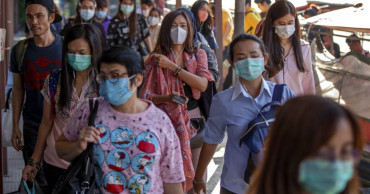Chinese Foreign Minister Wang Yi
China to continue support to Bangladesh's development: Wang Yi
Chinese Foreign Minister Wang Yi on Sunday said his country will continue its support to the development of Bangladesh, describing Dhaka as their “strategic development partner.”
The Chinese foreign minister said this during a courtesy call on Prime Minister Sheikh Hasina at her official residence Ganobhaban here, PM's Press Secretary Ihsanul Karim told reporters after the meeting.
"China will continue to the support to the development of Bangladesh as a strategic development partner,” the press secretary quoted Wang as telling the premier.
Wang said Beijing will support Dhaka on all its issues in the international forums too, according to the press secretary.
The Chinese foreign minister said Bangladesh made an unprecedented development under the leadership of PM Hasina.
He said China will also extend support to Bangladesh for the development of Digital Economy.
At the meeting, the prime minister sought the China's help to resolve the Rohingya issue, saying the displaced people are an extra burden for Bangladesh.
In reply, the Chinese minister said his country expects that the issue will be solved through the bilateral discussions between Bangladesh and Myanmar. If it needs tripartite intervention over the issue, China will play its role, he added.
Read:Chinese FM’s visit: Dhaka, Beijing sign 4 cooperation documents
Wang Yi explained their stance over the Taiwan issue to the prime minister.
In this context, Hasina reiterated that Bangladesh believes in "One China Policy."
Bangladesh values it's friendship with China, she told the Chinese minister.
The PM requested China to take measures for taking back the Bangladeshi students, who had to leave China during the Covid-19 period and are yet to return to their campuses there to complete their studies.
Referring to the Russia-Ukraine war, sanctions and counter sanctions, she said, "People (across the globe) are suffering from all of these. South Asia, South East Asia and China can work together for economic progress."
Recalling the visits of Bangabandhu to China in 1952 and 1957, Hasina said Bangabandhu was a great admirer of the founder of the People's Republic of China, Mao Zedong, which was found in Bangabandhu's book "Amar Dekha Naya Chin" (The New China as I Saw).
The premier greeted the Chinese president and thanked him for giving a video message marking the celebration of the Golden Jubilee of Bangladesh and Birth Centenary of Father of the Nation Bangabandhu Sheikh Mujibur Rahman.
Earlier the Chinese foreign minister also conveyed their president Xi Jinping's greetings to Bangladesh prime minister.
The Chinese president also thanked Sheikh Hasina for sending a message marking 100 years of the Communist Party of China.
Foreign Minister AK Abdul Momen, PM's Principal Secretary Ahmad Kaikaus, PM's Press Secretary Ihsanul Karim and Chinese Ambassador to Bangladesh Li Jiming were present.
Chinese Foreign Minister Wang Yi arrived in Dhaka on Saturday evening on a two-day trip to discuss bilateral, regional and global issues with Bangladesh leadership.
3 years ago
G-20 meeting may lead to wider divisions over war in Ukraine
Foreign ministers from the world’s largest nations are looking to address the war in Ukraine and its impact on global energy and food security when they meet in Indonesia this week. Yet instead of providing unity, the talks may well exacerbate existing divides over the Ukraine conflict.
U.S. Secretary of State Antony Blinken, Russian Foreign Minister Sergey Lavrov and Chinese Foreign Minister Wang Yi are set to attend the Group of 20 meeting in the Indonesian resort of Bali, which will set the stage for a summit of G-20 leaders at the same venue in November.
It will mark the first time Blinken and Lavrov have been in the same room, let alone the same city, since January. There’s no indication the two will meet separately, but even without a one-on-one with Lavrov, Blinken could find himself in some difficult discussions.
The State Department announced Tuesday that Blinken will hold separate talks with Wang at a time when already extremely tense U.S.-China relations have been worsened by Beijing’s friendly ties with Moscow.
And, unlike in recent leader-level meetings with NATO partners and other like-minded partners, Blinken will find himself among diplomats from countries wary of the U.S. approach to Ukraine and concerned about its impact on them.
U.S. officials say that aside from Wang, Blinken will have bilateral talks in Bali with counterparts from countries that have not seen eye to eye with the West on the Russian invasion, notably India, which has increased purchases of Russian oil even as the U.S. and Europe have tried to choke off that revenue stream for Moscow.
In announcing that Blinken would meet with Wang in Bali, the State Department had little to say about the possibility of him seeing Lavrov, whom the U.S. has shunned since the Ukraine invasion in February.
The department said there would not be a formal meeting between Blinken and Lavrov, whom U.S. officials accuse of a lack of seriousness before, during and after the invasion of Ukraine.
“We would like to see the Russians be serious about diplomacy,” State Department spokesman Ned Price said. “We have not seen that yet. We would like to have the Russians give us a reason to meet on a bilateral basis with them, with Foreign Minister Lavrov, but the only thing we have seen emanate from Moscow is more brutality and aggression against the people and country of Ukraine.”
The Biden administration maintains there can be no “business as usual” with Moscow as long as the war continues. But neither Price nor other U.S. officials could rule out the possibility of a chance Blinken-Lavrov encounter in Bali, which would be their first since they last met in Geneva in January. Price declined to discuss what he called the “choreography” of the G-20.
Like almost all recent international diplomatic gatherings, the Bali meeting will be overshadowed by Ukraine. But unlike the Western-dominated G-7 and NATO summits held in Europe last week, the G-20 will have a different flavor.
China and many other participants, including India, South Africa and Brazil, have resisted signing onto U.S. and European full-throated opposition to Russia’s invasion. Some have outright refused Western entreaties to join condemnations of the conflict, which the U.S. and its allies see as an attack on the international rules-based order that has prevailed since the end of World War II.
Thus, there may be difficulty in achieving a G-20 consensus on efforts to mitigate the food and energy impacts of the Ukraine conflict, particularly with China and Russia in the room. That will not stop the U.S. from trying, according to American officials.
They want to see the G-20 put its weight behind a U.N.-backed initiative to free up some 20 million tons of Ukrainian grain for export mainly to the Middle East, Africa and Asia.
”We would like the G-20 to hold Russia accountable and insist that it support this initiative,” said Ramin Toloui, the assistant secretary of state for Economic and Business Affairs.
While a variety of nations, including G-20 host Indonesia, are pushing for Russia to ease its blockade in the Black Sea to allow grain to enter the global market, they remain wary of antagonizing Moscow and its friends in Beijing.
And that divergence has set the stage for a potentially contentious preparatory meeting ahead of November’s G-20 summit amid questions about whether Russian President Vladimir Putin will attend.
The U.S. has made clear it does not believe Putin should attend but has urged Indonesia to invite Ukrainian President Volodymr Zelenskyy should the Russian leader participate.
In the meantime, the U.S. and China are separately at severe odds over numerous issues ranging from trade and human rights to Taiwan and disputes in the South China Sea.
Blinken’s meeting with Wang was announced after China’s trade envoy with Washington expressed concern about U.S. tariffs on Chinese imports in a call with with U.S. Treasury Secretary Janet Yellen. Neither side gave any indication that progress has been made on the matter and U.S. officials downplayed the chances for any breakthroughs in the short term.
In his meeting with Wang, U.S. officials said Blinken would instead be pressing to keep lines of communications open and creating “guardrails” to guide the world’s two largest economies as they navigate increasingly complex and potentially explosive matters.
“It’s absolutely critical that we have open lines of communication with our Chinese counterparts, particularly at the senior level ... to ensure that we prevent any miscalculation that could lead inadvertently to conflict and confrontation,” said Daniel Kritenbrink, the top U.S. diplomat for Asia.
From Bali, Blinken will travel to Bangkok, Thailand, to make up for a trip to the Thai capital that he was forced to cancel late last year due to COVID-19. In addition to Thai officials, Blinken will meet with refugees who have fled ongoing political violence and repression in Myanmar since a coup toppled a civilian government in February 2021.
3 years ago
Chinese FM wishes quick recovery of Dr Momen
Chinese Foreign Minister Wang Yi has sent a message to Foreign Minister Dr AK Abdul Momen wishing his speedy recovery.
5 years ago
Returnees from China to remain under observation: FM
Foreign Minister Dr AK Abdul Momen on Wednesday said the government will keep those who will return to Bangladesh under observation before China lifts the ongoing 14-day restriction to avoid any risk.
6 years ago





